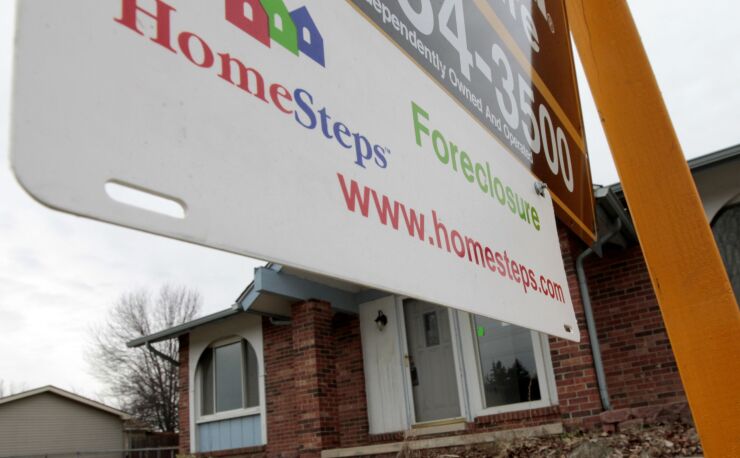Want unlimited access to top ideas and insights?
The housing market for millennial and Generation Z consumers in 2025 is in a volatile state, as everything from climate change to proposed tariffs on building materials likely to shake up the average home values. So what do those starting to explore buying their next — or first — need to be most aware of?
Research published in late 2024 by management consulting firm Boston Consulting Group forecasts that the share of Gen Z and millennial mortgage holders will quadruple within the next four years.
"While current market conditions have impacted timelines, this next generation of homebuyers is resolute in their desire to achieve homeownership. … It's up to us as real estate agents to provide them with the right tools and guidance to help them reach their goals of homeownership," Amy Lessinger, president of RE/MAX, LLC, said in a
Market conditions have trended positively in recent weeks, with 30-year fixed rate dropping by two basis points to 6.87% for the week ending Feb. 13, according to
Refinance rates fared well too, with the 30-year conforming rate dipping by a similar two basis points to 6.95% for the seven days ending Feb 7, as per data from
Read more:
This trend was reflected in
But recent economic developments have quelled further optimism among consumers and regulators alike.
Earlier this month, Federal Reserve Chairman Jerome Powell said while speaking to members of the Senate Banking Committee that he predicts some areas of the country like those "coastal areas [and] areas where there are a lot of fires" will be
"I don't know that it's a financial stability issue, but it certainly will have significant economic consequences," Powell said.
Month-over-month foreclosure filings were up 8% to 30,816 in January, but industry experts with Attom Data Solutions say it's too soon to tell if this is
"It's too early to know if 2025 will shift from the general 2024 trends of a continued decline in foreclosure activity," Rob Barber, chief executive of Attom Data Solutions, said in a press release. "We will keep a close eye on the market to see how interest rates, inflation, employment shifts and other market dynamics impact foreclosures in 2025."
Read more:
Learn more about the market figures plaguing young homebuyers and what hurdles they need to clear when seeking out their next piece of property.

2025 could see fewer foreclosure auctions, if economy holds steady
Completed foreclosure actions have been steadily declining over the last few years, from 84,000 in 2023 to a baseline case of 69,000 in 2025, according to data from Auction.com.
The consistent growth in home prices has stemmed the rise of foreclosures according to economists, but unemployment is a key variable experts are looking at to gauge how the number of auctions could trend this year — rising instead of falling.
"Some emerging risks in the economy and housing market are pushing delinquencies higher, but those higher delinquencies will
Read more:

Cornerstone opens division specializing in boosting homeownership
The $2.6 billion-asset Cornerstone Capital Bank in Houston is spinning up a Community Lending Division to help underserved consumers pursue their homeownership goals, and has established 1,000 families as its first benchmark to hit for the first year of operating.
The new unit will do business in 45 states and the District of Columbia, but be located in Arlington, Texas, and led by Jessie Jackson and Rod See, senior vice presidents and co-managing directors. The mortgage banking unit was a non-bank lender prior to the
"This initiative reflects Cornerstone's commitment to creating solutions that make a lasting difference," Adam Laird, CEO of mortgage banking at Cornerstone Capital Bank, said in a press release. "By expanding access to housing, we are fulfilling our mission of building stronger communities through exceptional service and personal engagement."
Read more:

Gen Z, millennials most likely to move across state lines
A recent report by storage marketplace company
Higher average moving costs and home prices have dissuaded many homeowners from uprooting, with 88% of consumers staying in the same home year over year, further complemented by
But Gen Z and millennial movers, each respectively accounting for 30% of the overall total, aren't deterred by those factors. The data found that South Carolina and Arizona were the two most popular landing spots for Gen Z Americans, while Texas and North Carolina were the regions of choice for millennials.
Read more:

Why closing costs can vary so much
When it comes to what factors influence closing costs, home prices and state and local rules are the biggest culprits that drive up the price tag for homebuyers.
Data from information services provider CoreLogic found that closing costs across the U.S. average roughly $7,300 for the first half of 2023 when
Rajul Sood, managing director and head of banking at Acuity Knowledge Partners, told NMN's
"The costs are increasingly high and they are differentiated," Sood said.
Read more:

What closing costs could look like in 2025
The downfall of the Consumer Financial Protection Bureau has brought a renewed focus on its
The CFPB launched its inquiry following a
"I don't know that I expect that singular focus to continue, although Trump also has made some comments around trying to drive more affordable housing," Justin Wiseman, vice president for residential policy and managing regulatory counsel at the Mortgage Bankers Association, told NMN's





